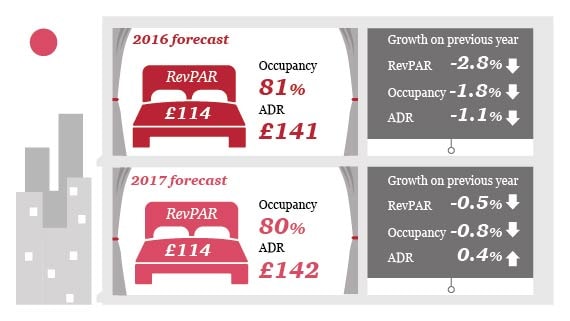Facing the future: UK hotels forecast 2017
HTFO | Nov 03, 2016 | Comments 0
Here you will find our forecast for the UK hotel industry for 2017, and what we think will be the key drivers and trends, impacting hoteliers in the coming year.
Join the conversation on twitter: #hotelsforecast
Key findings
While the full impact of the UK vote to leave the EU will not be known for some time, economic growth is expected to slow. A weak pound should provide a boost to inbound leisure travel, but security concerns, tight corporate travel budgets, above average supply growth (especially in London) and consumer and corporate uncertainty will create an unfavorable backdrop. The industry is also tackling ongoing disruption via the Sharing Economy. We retain a cautious outlook.
UK hotels forecast 2017

London
It’s a mixed outlook for London, which has recently seen weak demand chasing too many rooms, uncertainty around the EU referendum and security concerns. Businesses are also cutting travel budgets. 2016 also faces comparison with the boost from 2015’s Rugby World Cup year.
Forecast for 2017
Uncertainty following the EU referendum, security concerns and 7,000 new rooms in the pipeline, will act as a drag on performance. However, the weak pound may bring short term benefits for international leisure travellers. While we forecast a decline on key KPIs with RevPAR down 0.5%, it is important to remember however that London will still have some of the fullest rooms by global standards, at 80% occupancy in 2017, with average room prices reaching £142 in 2017.
The regional hotel sector is still a growth story. Most cities have had a good 2016 so far, even if the pace of growth slowed. For 2017, despite the forecast economic slowdown we expect 2.3% RevPAR. An increase in “Staycations” for domestic travel, attempts by the UK to boost tourism to the regions and the attraction of a weak pound to international leisure travellers will boost some cities. In fact, despite some high active room pipelines hoteliers are telling us that Manchester, Edinburgh and Birmingham will be star performers in 2017. Glasgow, Cardiff and Liverpool are also expected to do well. We forecast occupancy to hit a record 77% and remain there in 2017. In 2017 the price of a room in a regional hotel could hit £70 in nominal terms.

What’s driving the bus?
“Hospitality is a key sector for growth, employment and overseas earnings in the UK. It is our 6th largest contributor to export earnings and 4th largest employer – accounting for 4.49 million people or 10% of the workforce and over 180,000 businesses. A weaker pound post EU referendum should make the UK a cheaper destination for visitors. However, the effect of uncertainty following the EU referendum on business travel and inward migration from other EU countries could adversely affect the hospitality sector’s revenues and its ability to recruit and retain skilled staff.”
Andrew Sentance, Senior Economic Advisor

Hotels and the sharing economy
Peer-to-peer accommodation is now one of the most established sharing economy sectors – we estimate that commerce generated across these platforms could rise to nearly £30bn by 2025. The impact of the sharing economy may soon be felt more keenly by hoteliers as players diversify and innovate. For example, Airbnb’s recent announcement of a move into business and meetings has been strengthened by partnership with business travel companies.
So are hoteliers concerned? Our poll of hoteliers reveals that many continue to regard sharing economy platforms as a low to moderate threat to their traditional business mode, a view that contrasts with what we are seeing on the ground. Almost 60% had not seen, or did not admit to seeing, new sharing models impacting their business. Hoteliers’ attitude could be partly because P2P is a stealth competitor and hoteliers find it hard to accurately measure the impact on hotel performance.
Deals outlook
Compared to the unprecedented levels of deals of over £9 billion in 2015, we have seen a significant slowdown this year from the uncertainty surrounding the EU referendum vote.
We forecast a further c. £3.4bn of deals to complete by the end of the year, resulting in a forecast total deal volume of c. £5.5bn for 2016 – just exceeding half the prior year’s record levels.
With a continuing stronger domestic investor market, there also follows a lesser demand for the larger portfolio deals that were experienced in 2015. We expect transaction levels to be relatively subdued in 2016 and 2017 in comparison to 2015 but expect a flight to good quality core hotels as risk premiums widen across the market.
Source: http://www.pwc.co.uk/hotelsforecast
Filed Under: Hotels
About the Author:
